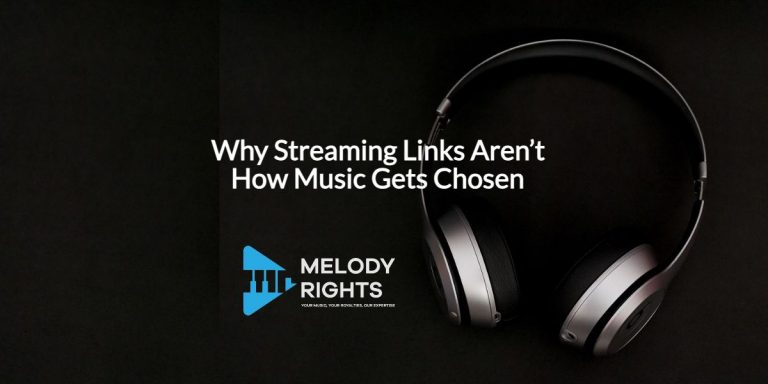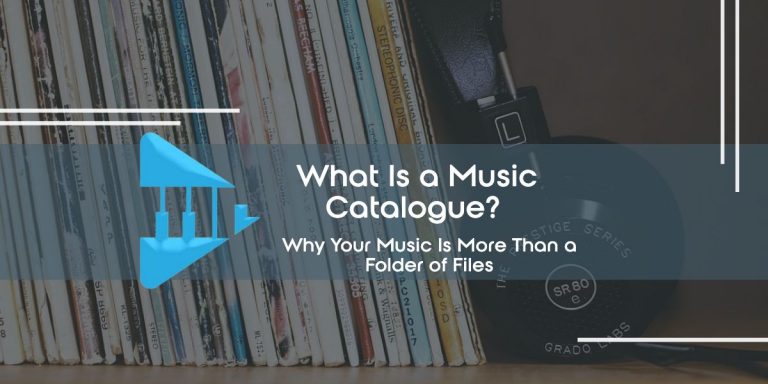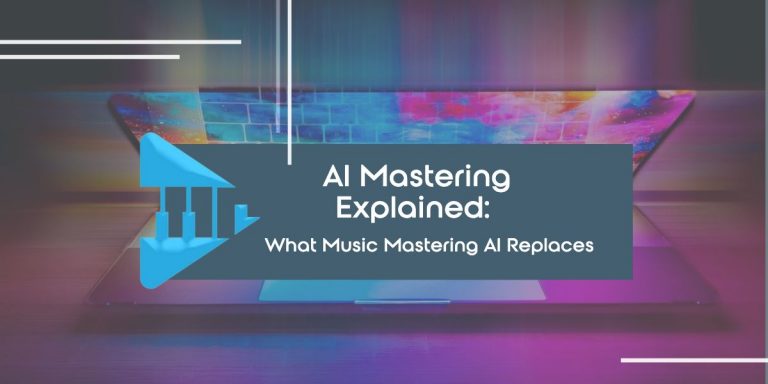Table of Contents
ToggleTL;DR (Key Summary) What Every Songwriter Should Know
- There are six royalty types: performance, mechanical, sync, master, print, and micro-sync
- Most indie artists only collect one or two
- Unregistered songs, missing metadata, or skipped societies mean lost income
- You need to connect each royalty pipeline manually
- Melody Rights helps you set it up, stay in control, and get paid without drowning in admin
How Much Royalties Do Songwriters Get Paid? A Deep Dive into the Royalties Most Artists Miss
Jasmin’s story is all too common. Her song hit a couple Spotify playlists, got picked up for a student short film, and even made it into a live acoustic set at a local venue. She felt a shift, like this time, it might actually go somewhere.
Then months passed. No payout arrived. No emails. No clue where the money was supposed to come from.
She hadn’t registered with a PRO or logged her live performances. No one told her to upload her metadata anywhere, and she didn’t know there were different types of royalties, let alone how to collect them.
That story’s not unique, it’s happening every day. In the UK, songwriters missed out on millions in uncollected live performance royalties because setlists weren’t tracked at over 100,000 gigs.
In a recent survey, over 60% of songwriters reported that their streaming income was insufficient to cover their basic expenses. Only 10% were making more than $30K a year.
This isn’t about talent. It’s about infrastructure. And most indie artists don’t get taught how to build it.
Simple Breakdown: What Royalties Songwriters Can Actually Earn

If you’re writing songs, you’re not just creating melodies, you’re generating multiple revenue streams. But most artists only ever see a slice of it.
Think of royalties like your stage setup. If your mic is plugged in but your DI box isn’t, the room hears half the song. Every cable matters. Every connection needs to be live if you want your full sound and your full income.
Every song has six royalty paths. Most artists miss at least half.
| Royalty Type | Who Pays It / What Triggers It | Who Collects It (US/UK) |
| Performance | Public plays: radio, TV, venues, streaming | ASCAP, BMI / PRS |
| Mechanical (Digital) | Streams, downloads | MLC / MCPS |
| Mechanical (Physical) | CD, vinyl, cassettes, toys | HFA / MCPS |
| Sync | Licensing to film, TV, games | Paid directly, PROs handle backend |
| Master | Recording rights from streams and plays | SoundExchange / PPL |
| Sheet music and lyric reproductions | Publishers, sheet music platforms | |
| Micro-Sync | UGC on YouTube, TikTok, Instagram | Content ID systems, rights admin partners |
How to Set Up Your Royalties Without Getting Lost in the Maze
This is the part no one warns you about. The song’s out, but unless you set things up right, the payments never come.
Sorting your royalty setup isn’t just admin. It’s the difference between getting paid or staying invisible.
Think of it like prepping for tour. You need the map, the gear, the contacts, the plan. Otherwise, you’re just driving in circles.
Here’s where most artists get stuck, and how to fix each leak before it costs you.

Leak #1: You’ve played gigs or had radio spins but never seen a check
Fix it: Register with a Performance Rights Organisation (PRO)
In the UK, sign up for PRS for Music. In the US, choose ASCAP or BMI. Once you’re in, register each track, and log your setlists after every show. This is how you get paid for performance royalties from streaming, radio, and live gigs.
Leak #2: Your track is streaming but you’re missing mechanical royalties
Fix it: Register with a mechanical rights organisation
In the US, register with the MLC. In the UK, it’s MCPS. Outside of these, each country has its own setup. Or use a service like Melody Rights to manage this across borders. Make sure your metadata is clean and consistent. Distributors don’t always do this right.
Not sure where to start? This guide walks you through how to register your music the right way.
Leak #3: You don’t know what neighboring rights are
Fix it: Register to collect master recording royalties
If you own or perform on the recording, you are owed royalties. In the UK, join PPL. In the US, use SoundExchange. These royalties are separate from songwriting and tied to the recording itself.
Leak #4: You want sync deals but haven’t set up your rights
Fix it: Get sync-ready
If your song gets licensed but your rights info is incomplete, you may miss out. Make sure you know your splits, your metadata is complete, and your files are ready (instrumentals too). Melody Rights helps you prep and submit your tracks for sync, then tracks backend royalties if they get placed.
Leak #5: Your music is on TikTok but you’re not earning from it
Fix it: Claim your user-generated content royalties
If your music appears on TikTok, Instagram, or YouTube, you can earn from that. But only if your tracks are properly claimed. Use Content ID or a rights admin service like Melody Rights to stay covered.
This might seem like a lot, but once it’s in place, the royalties start to flow. You don’t have to handle it all alone.
The Fix Doesn’t Have to Be a Full-Time Job
You shouldn’t need to chase every royalty or spend hours registering the same song in five places.
At Melody Rights, we help you build the infrastructure behind your music. That means proper setup, delivery, and tracking, without dragging you away from your creative work.
We’re not a sync library or a generic distributor. We’re your royalty-savvy co-pilot, especially for sync. You stay in control of your rights, while we help handle the heavy lifting in the background.
If you want your music to earn everything it can, you don’t need to do it alone.
Ready to make sure you’re collecting what you’ve earned?
How much royalties do songwriters get: Get started with Melody Rights
Frequently Asked Questions
Still wondering how much royalties do songwriters get in real-world terms? It depends on how well your rights are set up. Melody Rights helps make sure you’re not missing any part of the puzzle.
How much royalties do songwriters get?
It depends on streams, plays, and sync deals. In the UK, PRS and MCPS collect royalties. In the US, PROs like ASCAP and BMI handle performance royalties, while the MLC manages digital mechanicals. Without proper setup, many writers only see a small slice.
Who collects mechanical royalties?
How do I collect mechanical royalties?
Register with the MLC (US) or MCPS (UK). Keep your metadata clean and consistent. If you’re releasing music globally, use a service like Melody Rights to handle multiple territories at once.
How do producers collect royalties?
Producers earn from the master side, not always from publishing. To get paid:
Register with SoundExchange (US) or PPL (UK)
Send a Letter of Direction if owed a percentage
Negotiate songwriting credit if involved creatively
How do I collect international mechanical royalties?
You’ll need to register in each region or use a global admin partner, such as Melody Rights. Societies vary by country, but the setup must be intentional.
How do I collect all music royalties?
You need to connect all six royalty streams:
– PRO for performance
– MLC/MCPS for mechanicals
– PPL/SoundExchange for master rights
– Sync-ready setup for placements
– Content ID for social platforms
– Proper registration and metadata
Contact Melody Rights to handle all your royalty streams.
Do producers get mechanical royalties?
Only if they co-wrote the song or negotiated a backend share. Usually, producers earn from the master side unless the publishing split says otherwise.
Does Spotify pay mechanical royalties?
Yes. In the US, through the MLC. In the UK, through PRS and MCPS. But songs must be registered correctly with those bodies to receive full payouts.
Is there a mechanical royalties calculator?
There’s no universal calculator, but The MLC outlines standard rates in the US. Earnings vary based on usage, region, and splits.
Final Note: Jasmin’s Story Isn’t Rare. But It Can Be Different.
Jasmin didn’t fail, she just didn’t know how the system worked. Most indie artists don’t.
But the steps exist, and now you have them.
Royalty setup is the difference between silence and getting paid. Between wondering what went wrong, and finally seeing the return on your work.
If you’ve felt that same confusion, you’re not behind. You just didn’t have the right map.
Melody Rights helps you walk it, with real support that puts your music and your income first.



